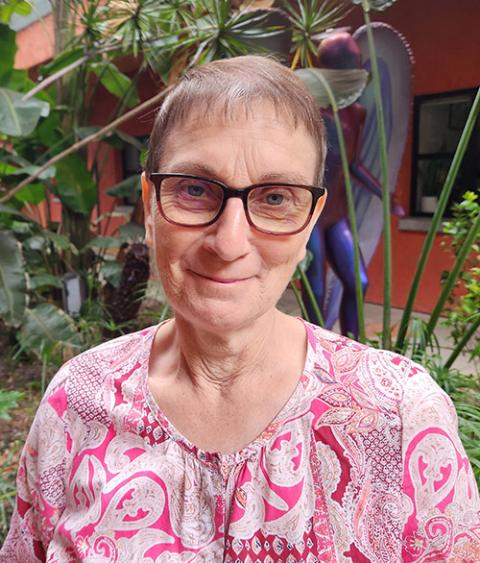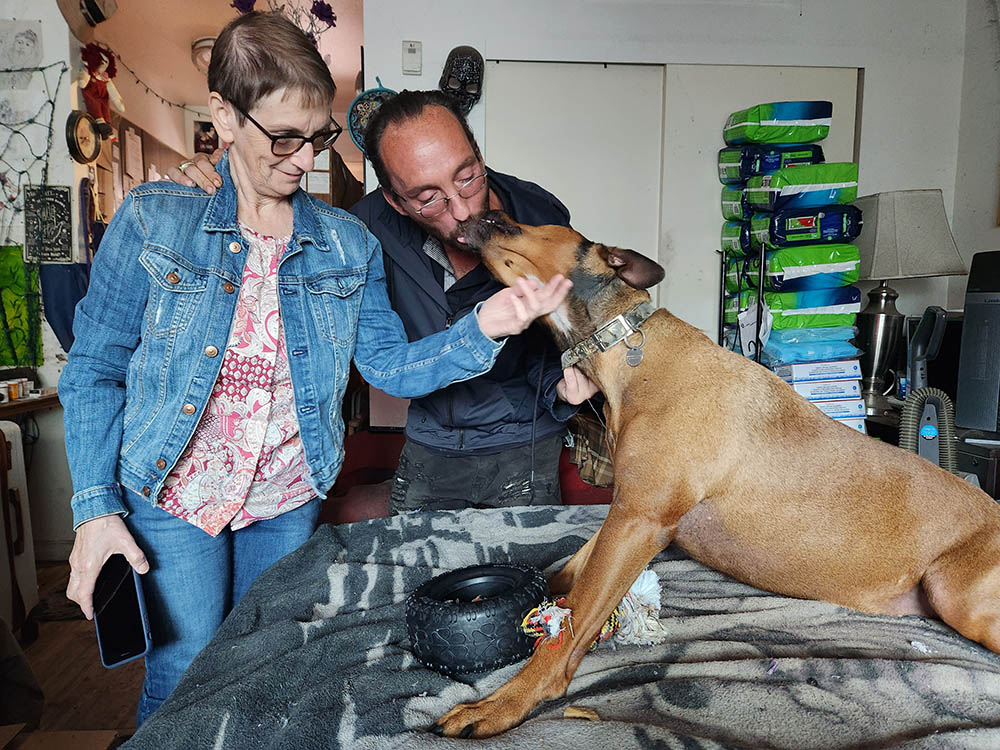
Tommy Dunphy and his beloved dog, Arianna, with friend Sr. Margaret Farrell, left, in Dunphy's small studio apartment (GSR photo/Chris Herlinger)
Nearly four years ago, I wrote about Tommy Dunphy's "quiet success" as a former homeless man who was doing his best to live a "clean" life, stay out of jail and off the streets of Los Angeles' Skid Row.
I'm happy to say that he's doing OK — not without struggles, but for the moment, doing all right, in part thanks to the watchful eye of an Irish sister who has ministered in Los Angeles for 25 years.
"I ain't going anywhere," Tommy, 41, told me during a recent interview at his apartment off of Los Angeles' Skid Row. "I'm doing what I can do."
When I first met Tommy for our series on homelessness, he credited his success to at least three things. One was his low-rent, government-subsidized apartment in the Gateway apartment complex. This was, and remains, a lifeline for Tommy, as are his public assistance checks.
The second: watching after his beloved dog, Arianna, whose care has anchored his life for about six years.
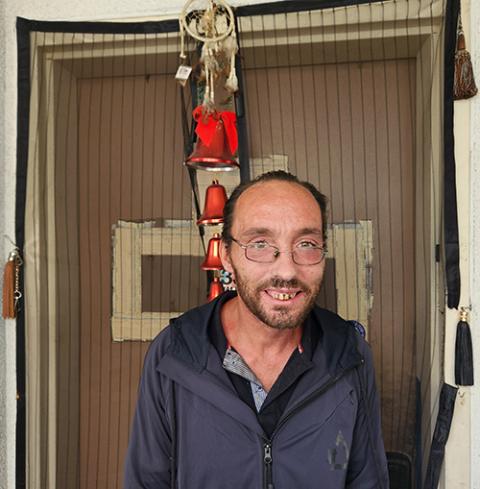
Tommy Dunphy outside his apartment in the Gateway apartment complex on Skid Row, near Los Angeles' downtown (GSR photo/Chris Herlinger)
The third is his longtime friendship with Sr. Margaret Farrell, a member of the Religious Sisters of Charity, and the spiritual ministry coordinator at Covenant House California in Los Angeles. (Covenant House focuses on assisting homeless youth.) Sister Margaret has known Tommy for years, starting when he was orphaned and ended up in juvenile hall.
Sister Margaret has been committed to maintaining their friendship, by regularly visiting Skid Row to check on Tommy — she will drop by on Thanksgiving and provide him a holiday meal — and also to minister to others in the area.
Another assignment took me recently to Los Angeles, and I was eager to meet with Tommy and Sister Margaret and see how they were both faring.
Both have had some health challenges since I saw them in late 2019, but their bond remains strong.
Tommy, who spent nearly two decades in and out of prisons for drug-related offenses, still struggles with his addictions. That remains worrying — something he acknowledges — but he seems to have figured out a way to keep his head above water and maintain his equilibrium.
Advertisement
Tommy goes to regular doctors' appointments to keep his HIV under control and manage his mental health challenges, though he acknowledges he is not very social and says he sometimes feels he's "stuck in a routine."
"I'd like more social interaction with people," he said.
Day-to-day, he said, his greatest meaning comes from caring for Arianna — taking her for daily walks and making sure she is well-fed and healthy. She clearly seems to reciprocate the love — Arianna is an affectionate dog who takes great pleasure in Tommy's company, as well as visitors, like me and Sister Margaret.
"Arianna — she keeps me going," he said. "She's the best thing in my world."
On the Wednesday morning Sister Margaret and I visited Tommy, Sister Margaret brought Tommy some needed household items and said she would accompany him on some upcoming appointments to see what can be done to help his ongoing addiction challenges.
"Everyone needs an advocate," she said, adding that both are committed to seeing that he succeeds. "I try, we try," she said.
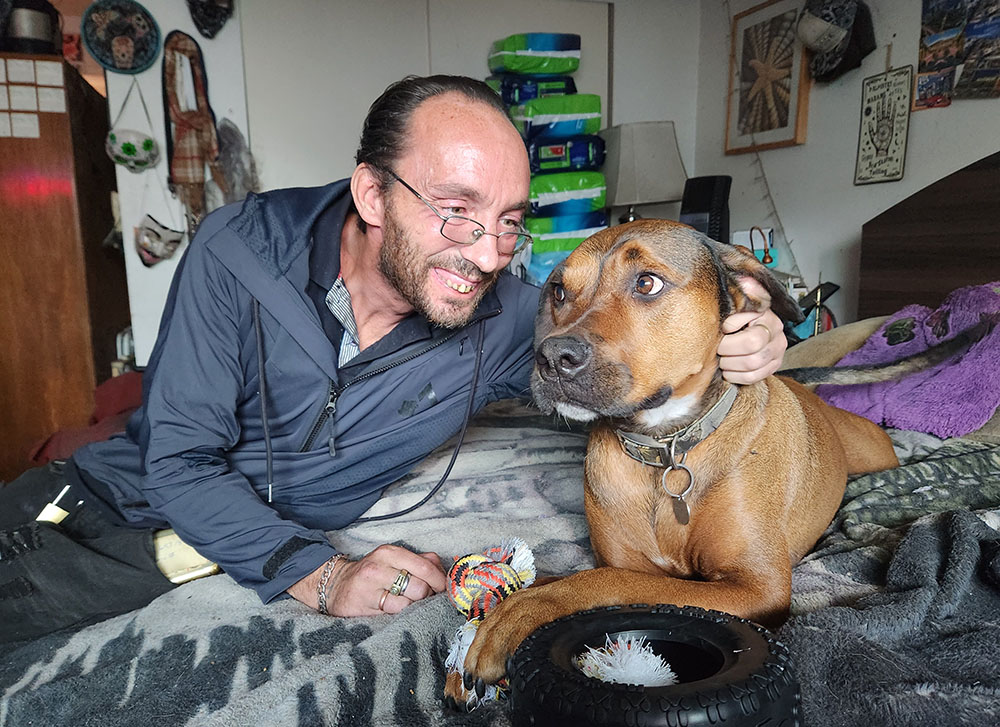
Tommy Dunphy says watching after his beloved dog, Arianna, has helped anchor his life for about six years. (GSR photo/Chris Herlinger)
Later, Sister Margaret told me that Tommy's challenges remain considerable but she gives him credit for trying to balance so much in what are difficult circumstances.
The importance of his rent-subsidized apartment, she told me, cannot be overestimated.
But that points to the continued issue of homelessness and the need for affordable housing — a situation that remains critical in Los Angeles and other large American cities.
Perhaps symbolically for what is happening in many urban areas (including New York City, where I live), I noticed something new: high-rise, and obviously high-end, apartments are being constructed in Tommy's neighborhood, a section of town where makeshift "tent cities" seem to have proliferated since I last visited Skid Row in 2019.
"It's insane," Farrell said of the contrasts that exist nearly side-by-side in Los Angeles. What the Skid Row neighborhood will look like in five to 10 years is anyone's guess, she said, but the encroaching high-rises suggest that the homeless may have to look elsewhere for shelter.
She calls that an example of the "brokenness of society," something that her congregation's charism is committed to healing.
Tommy is fortunate to have his housing, she said, but she added, "Tommy is typical of someone who was once homeless and who has housing but who's just getting by in other ways." Housing is key, she said, but so is access to medical services.
Lon Vanita Usher, Farrell's colleague at Covenant House California, concurs. She told me about the ongoing challenges of homelessness in Los Angeles, which she said had an uptick during the pandemic, as people lost their jobs and the ability to afford decent housing.
Earlier this year, the Los Angeles Times reported that, based on local government data, homelessness increased 9% in Los Angeles County and 10% in the city of Los Angeles in 2022.
What that means is that more than 75,000 people "experience homelessness in the county on any given night" — with people "living in interim housing or a tent, car, van, RV ... or makeshift shelter," the Times reported.
The report also noted that since 2015, homelessness has increased an astonishing "70% in the county and 80% in the city."
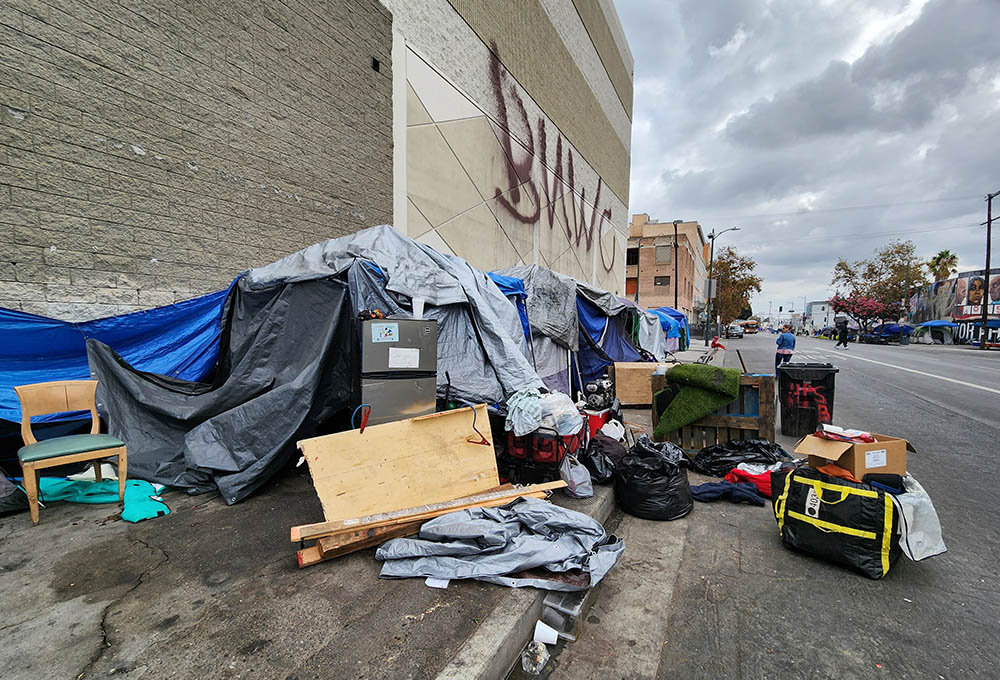
Tents housing homeless people are common on the streets of Los Angeles' Skid Row near downtown. (GSR photo/Chris Herlinger)
One of the factors in all of this, Usher told me, is that the cost of housing is soaring — it can cost $1,800 to rent a studio apartment in Los Angeles and as much as $2,500 for a one-bedroom apartment, she said.
"This is a big, big challenge even for people who are working," Usher said, adding that there are many well-educated people who have had good jobs who now find themselves without decent housing in Los Angeles.
Tommy is fortunate that he qualifies for low-income housing. But without it — well, both he and Sister Margaret don't like to contemplate that prospect.
"It's important for all people to have their space, a place they can call home," Sister Margaret said. "Without those four walls, you don't feel stable in life. Tommy can attest to that."
"All I've got," Tommy said, pointing to his small studio apartment, "is what I have here."

